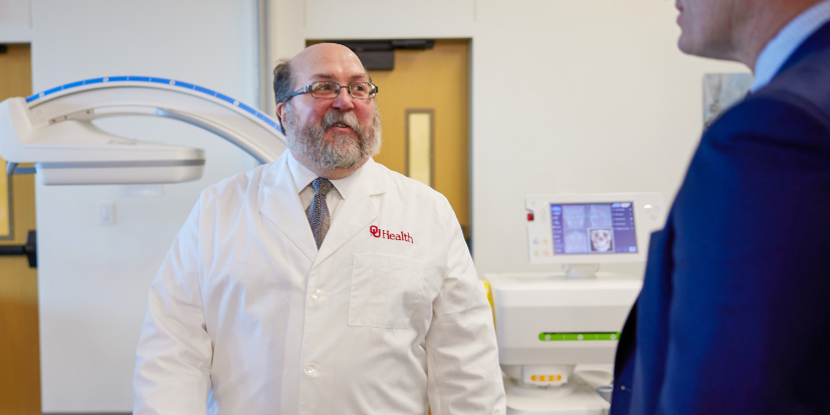OU Health Oncologist Helps Lead Clinical Trial Showing Best Treatment Sequence for Metastatic Melanoma
- Category: News
- Posted On:

An OU Health Stephenson Cancer Center physician served as an investigator for a National Cancer Institute-sponsored clinical trial that yielded important answers concerning the treatment of patients with advanced melanoma skin cancer.
 Alexandra Ikeguchi, M.D., an oncologist at Stephenson Cancer Center, led OU Health’s participation in the trial, which examined two treatment sequences for advanced melanoma to determine which one increased the survival rate for patients. The treatments involved four drugs given in two combinations — two immunotherapy drugs and two targeted therapy drugs. The trial produced a clear answer: Patients who received the two immunotherapy drugs first, followed by the targeted therapy drugs, had a 20% increase in survival over two years.
Alexandra Ikeguchi, M.D., an oncologist at Stephenson Cancer Center, led OU Health’s participation in the trial, which examined two treatment sequences for advanced melanoma to determine which one increased the survival rate for patients. The treatments involved four drugs given in two combinations — two immunotherapy drugs and two targeted therapy drugs. The trial produced a clear answer: Patients who received the two immunotherapy drugs first, followed by the targeted therapy drugs, had a 20% increase in survival over two years.
“These two treatments have been considered the standard of care for metastatic melanoma, and they were both developed in the same time period, but they had never been compared head to head,” Ikeguchi said. “This trial is important because it demonstrates that our patients with advanced melanoma will likely live longer if they receive the immunotherapy drugs first, followed by the targeted therapy drugs.”
The two immunotherapy drugs are nivolumab and ipilimumab (N/I), and the two targeted therapy drugs are dabrafenib and trametinib (D/T). As immunotherapy drugs, the N/I combination works by prompting the body’s natural defenses to fight cancer. In this case, it keeps the body’s T cells from “turning off” so that they can actively attack cancer cells. The D/T combination directly targets cancers with a BRAF V600 mutation, which drives cancer cell growth. The mutation is present in about half of patients with metastatic melanoma skin cancer, Ikeguchi said.
Treatment at Stephenson Cancer Center has aligned with the findings. The trial is also important news for community oncologists who are not affiliated with a research-driven academic center like OU Health. Community oncologists treat fewer patients with advanced melanoma, and because the N/I immunotherapy combination can cause significant side effects, those oncologists tend to shy away from prescribing it, Ikeguchi said.
“The toxicity associated with the N/I combination is manageable, but you have to be experienced in managing it. If oncologists only see half a dozen patients a year with advanced melanoma, they may not have the comfort level in doing that,” she said. “Most oncologists in the community have been prescribing targeted therapy, so this clinical trial is saying that practice should be re-examined.”
The trial, called the DREAMseq phase 3 clinical trial, was carried out by researchers from the ECOG-ACRIN Cancer Research Group (Eastern Cooperative Oncology Group and American College of Radiology Imaging Network). It consists of 1,300 member institutions in the United States and around the world and is primarily supported through research funding from the National Cancer Institute. As a National Cancer Institute-Designated Cancer Center, Stephenson Cancer Center participates in ECOG-ACRIN clinical trials and those of many other oncology groups.
“Because we are a National Cancer Institute-Designated Center, we don’t have to confine ourselves to one cooperative group. We can pick out trials that are important and beneficial to our patient population no matter where they are headquartered,” Ikeguchi said.
“Our patients at Stephenson Cancer Center are very eager to go on clinical trials, as was the case with this trial,” she added. “They want to help themselves, but they are also altruistic in giving their time and effort to a trial that will ultimately help many people.”



